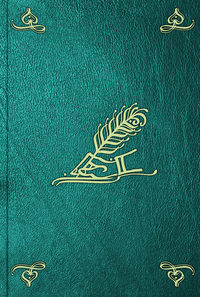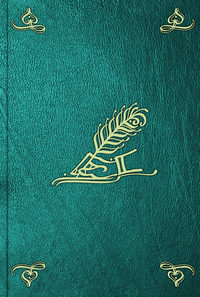 полная версия
полная версияThe Memoirs of Count Grammont – Volume 03
[This lady was Isabella, daughter to Lewis de Nassau, Lord Beverwaert, son to Maurice, Prince of Orange, and Count Nassau. By her, Lord Arlington had an only daughter, named Isabella.]
without considering her fickleness, or the obstacles he had to encounter. His intention, which we mentioned before, of establishing himself in the confidence of Miss Stewart, no longer occupied his thoughts: she now was of opinion that she was capable of being the mistress of her own conduct: she had done all that was necessary to inflame the king's passions, without exposing her virtue by granting the last favours; but the eagerness of a passionate lover, blessed with favourable opportunities, is difficult to withstand, and still more difficult to vanquish; and Miss Stewart's virtue was almost exhausted, when the queen was attacked with a violent fever, which soon reduced her to extreme danger.
Then it was that Miss Stewart was greatly pleased with herself for the resistance she had made, though she had paid dearly for it: a thousand flattering hopes of greatness and glory filled her heart, and the additional respect that was universally paid her, contributed not a little to increase them. The queen was given over by her physicians: the few Portuguese women that had not been sent back to their own country filled the court with doleful cries; and the good nature of the king was much affected with the situation in which he saw a princess, whom, though he did not love her, yet he greatly esteemed. She loved him tenderly, and thinking that it was the last time she should ever speak to him, she told him, that the concern he showed for her death, was enough to make her quit life with regret; but that not possessing charms sufficient to merit his tenderness, she had at least the consolation in dying to give place to a consort who might be more worthy of it, and to whom heaven, perhaps, might grant a blessing that had been refused to her. At these words, she bathed his hands with some tears, which he thought would be her last: he mingled his own with hers; and without supposing she would take him at his word, he conjured her to live for his sake. She had never yet disobeyed him; and, however dangerous sudden impulses may be, when one is between life and death, this transport of joy, which might have proved fatal to her, saved her life, and the king's wonderful tenderness had an effect, for which every person did not thank heaven in the same manner.
Jermyn had now for some time been recovered of his wounds: however, Lady Castlemaine, finding his health in as deplorable a condition as ever, resolved to regain the king's heart, but in vain: for notwithstanding the softness of her tears, and the violence of her passions, Miss Stewart wholly possessed it. During this period the court was variously entertained: sometimes there were promenades, and at others the court beauties sallied out on horseback, and to make attacks with their charms and graces, sometimes successfully, sometimes otherwise, but always to the best of their abilities at other seasons there were such shows on the river, as the city of London alone can afford.
The Thames washes the sides of a large though not a magnificent palace of the kings of Great Britain: – [This was Whitehall, which was burnt down, except the banqueting-house, 4th January, 1698.] – from the stairs of this palace the court used to take water, in the summer evenings, when the heat and dust prevented their walking in the park: an infinite number of open boats, filled with the court and city beauties, attended the barges, in which were the Royal Family: collations, music, and fireworks, completed the scene. The Chevalier de Grammont always made one of the company, and it was very seldom that he did not add something of his own invention, agreeably to surprise by some unexpected stroke of magnificence and gallantry. Sometimes he had complete concerts of vocal and instrumental music, which he privately brought from Paris, and which struck up on a sudden in the midst of these parties; sometimes he gave banquets, which likewise came from France, and which, even in the midst of London, surpassed the king's collations. These entertainments sometimes exceeded, as others fell short of his expectations, but they always cost him an immense deal of money.
Lord Falmouth was one of those who had the greatest friendship and esteem for the Chevalier de Grammont: this profusion gave him concern, and as he often used to go and sup with him without ceremony, one day finding only Saint Evremond there, and a supper fit for half a dozen guests, who had been invited in form: "You must not," said he, addressing himself to the Chevalier de Grammont, "be obliged to me for this visit. I come from the king's 'coucher', where all the discourse was about you; and I can assure you that the manner in which the king spoke of you, could not afford you so much pleasure as I myself felt upon the occasion. You know very well, that he has long since offered you his good offices with the King of France; and for my own part," continued he, smiling, "you know very well that I would solicit him so to do, if it was not through fear of losing you as soon as your peace is made; but, thanks to Miss Hamilton, you are in no great haste: however, I am ordered by the king, my master, to acquaint you, that while you remain here, until you are restored to the favour of your sovereign, he presents you with a pension of fifteen hundred Jacobus's: it is indeed a trifle, considering the figure the Chevalier de Grammont makes among us; but it will assist him," said he, embracing him, "to give us sometimes a supper."
The Chevalier de Grammont received, as he ought, the offer of a favour he did not think proper to accept: "I acknowledge," said he, "the king's bounty in this proposal, but I am still more sensible of Lord Falmouth's generosity in it; and I request him to assure his Majesty of my perfect gratitude: the king, my master, will not suffer me to want, when he thinks fit to recall me; and while I continue here, I will let you see that I have wherewithal to give my English friends now and then a supper."
At these words, he called for his strong box, and showed him seven or eight thousand guineas in solid gold. Lord Falmouth, willing to improve to the Chevalier's advantage the refusal of so advantageous an offer, gave Monsieur de Comminge, then ambassador at the English court, an account of it; nor did Monsieur de Comminge fail to represent properly the merit of such a refusal to the French court.
Hyde Park, every one knows, is the promenade of London! nothing was so much in fashion, during the fine weather, as that promenade, which was the rendezvous of magnificence and beauty: every one, therefore, who had either sparkling eyes, or a splendid equipage, constantly repaired thither; and the king seemed pleased with the place.
Coaches with glasses were then a late invention.
[Coaches were first introduced into England in the year 1564. Taylor, the water poet, (Works, 1630, p. 240,) says, – "One William Boonen, a Dutchman, brought first the use of coaches hither; and the said Boonen was Queen Elizabeth's coachman; for, indeed, a coach was a strange monster in those days, and the sight of them put both horse and man into amazement." Dr. Percy observes, they were first drawn by two horses, and that it was the favourite Buckingham, who, about 1619, began to draw with six horses. About the same time, he introduced the sedan. 'The Ultimum Vale of John Carleton', 4to, 1663, p. 23, will, in a great measure, ascertain the time of the introduction of glass coaches. He says, "I could wish her (i. e. Mary Carleton's) coach (which she said my lord Taff bought for her in England, and sent it over to her, made of the new fashion, wide glasse, very stately; and her pages and lacquies were of the same livery,) was come for me," &c.]
The ladies were afraid of being shut up in them: they greatly preferred the pleasure of showing almost their whole persons, to the conveniences of modern coaches: that which was made for the king not being remarkable for its elegance, the Chevalier de Grammont was of opinion that something ingenious might be invented, which should partake of the ancient fashion, and likewise prove preferable to the modern; he therefore sent away Termes privately with all the necessary instructions to Paris: the Duke of Guise was likewise charged with this commission; and the courier, having by the favour of Providence escaped the quicksand, in a month's time brought safely over to England the most elegant and magnificent calash that had ever been seen, which the Chevalier presented to the king.
The Chevalier de Grammont had given orders that fifteen hundred louis should be expended upon it; but the Duke of Guise, who was his friend, to oblige him, laid out two thousand. All the court was in admiration at the magnificence of the present; and the king, charmed with the Chevalier's attention to everything which could afford him pleasure, failed not to acknowledge it: he would not, however, accept a present of so much value, but upon condition that the Chevalier should not refuse another from him.
The queen, imagining that so splendid a carriage might prove fortunate for her, wished to appear in it first, with the Duchess of York. Lady Castlemaine, who had seen them in it, thinking that it set off a fine figure to greater advantage than any other, desired the king to lend her this wonderful calash to appear in it the first fine day in Hyde Park: Miss Stewart had the same wish, and requested to have it on the same day. As it was impossible to reconcile these two goddesses, whose former union was turned into mortal hatred, the king was very much perplexed.
Lady Castlemaine was with child, and threatened to miscarry, if her rival was preferred; Miss Stewart threatened, that she never would be with child, if her request was not granted. This menace prevailed, and Lady Castlemaine's rage was so great, that she had almost kept her word; and it was believed that this triumph cost her rival some of her innocence.
The queen dowager, who, though she had no share in these broils, had no objection to them, and as usual being diverted with this circumstance, she took occasion to joke with the Chevalier de Grammont, for having thrown this bone of contention among such competitors; and did not fail to give him, in the presence of the whole court, those praises which so magnificent a present deserved: "But how comes it," said she, "that you have no equipage yourself, though you are at so great an expense? for I am told that you do not keep even a single footman, and that one of the common runners in the streets lights you home with a stinking link." "Madam," said he, "the Chevalier de Grammont hates pomp: my linkboy, of whom you speak, is faithful to my service; and besides, he is one of the bravest fellows in the world. Your Majesty is unacquainted with the nation of link-boys: it is a charming one, I can assure you: a man cannot step out in the night without being surrounded by a dozen of them. The first time I became acquainted with them, I retained all that offered me their services; so that when I arrived at Whitehall, I had at least two hundred about my chair: the sight was new; for those who had seen me pass with this illumination, asked whose funeral it was. These gentlemen, however, began fighting about some dozen shillings I had thrown among them then; and he whom your Majesty mentions having beaten three or four of his companions, I retained him for his valour. As for the parade of coaches and footmen, I despise it: I have sometimes had five or six valets-de-chambre at once, without having a single servant in livery, except my chaplain Poussatin." "How!" said the queen, bursting out laughing, "a chaplain in your livery! he surely was not a priest?" "Pardon me, madam," said he, "and the first priest in the world for dancing the Biscayan jig." "Chevalier," said the king, "pray tell us the history of your chaplain Poussatin."









